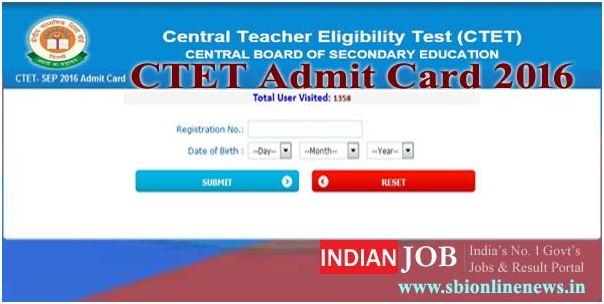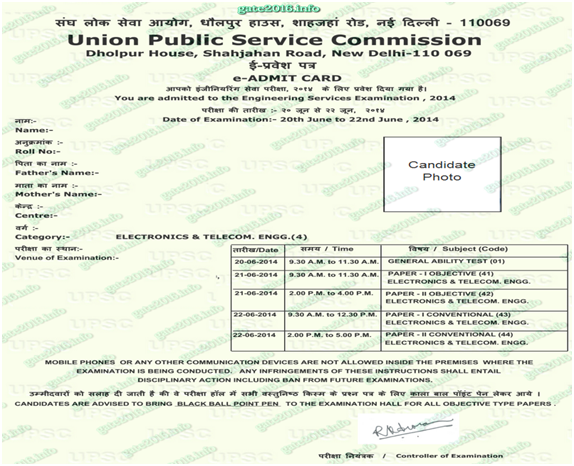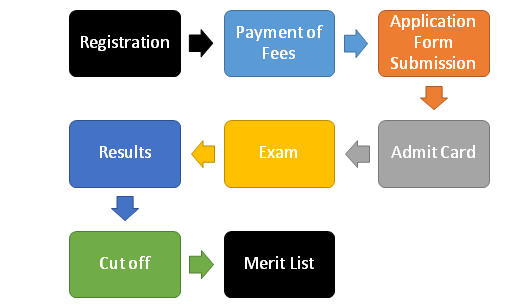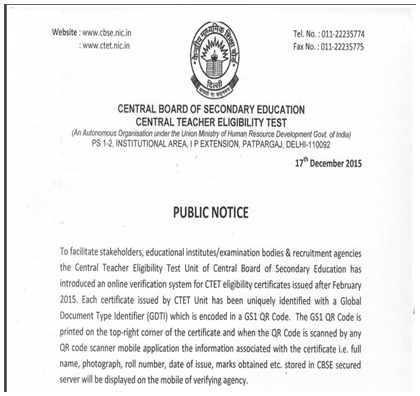CTET 2024 - Syllabus, Eligibility, Application form, 2024 Notification
Exam Summary
| Exam Name | Central Teacher Eligibility Test |
| Commonly Known As | CTET |
| Organizing Authority | Central Board of Secondary Education (CBSE) |
| Official Website | https://ctet.nic.in/ |
| Exam Type | National Level Recruitment Entrance Examination |
| Exam Category | Selection of Primary & Elementary Teachers in Central Government Schools |
| Mode of Exam | Pen-Paper based |
| Total Marks | Paper-I- 150
Paper II- 150 |
| Type of questions | MCQ |
| Exam duration | Paper-I- 2.5 hours
Paper II- 2.5 hours |
| Exam Date | April, 2018 |
What is CTET?
Central Teacher Eligibility Test (CTET) is a test conducted by the Central Board of Secondary Education (CBSE) for providing eligibility for selection of teachers in the Central Government/ State Government/UT/ CBSE affiliated schools. This exam is conducted twice a year, in February and September.
While it is mandatory for government schools such as Navodaya Vidyalaya and Kendriya Vidyalaya but today, it has become mandatory even for some private schools.
Structure of CTET exam
The CTET 2018 exam will be conducted at two levels- Paper-I and Paper-II. While Paper-I is for candidates wishing to teach classes 1 to 5, Paper-II is for candidates wishing to teach Classes 6 to 8. Those who wish to qualify for both can appear for both the papers. The exam is conducted twice in a year.
Both the papers are conducted only through offline (pen and paper-based)mode. The papers will have Objective type questions. The total time duration is 150 minutes for each paper. Differently abled candidates will get a compensatory time of 50 minutes.
For both the papers, there are five sections each. For Paper-I, each section has 30 questions and is of 30 marks. For Paper-II, the three compulsory sections are of 30 marks each and the optional sections are of 60 marks. The candidate has a choice between section IV and section V depending on whether they want to be a Mathematics/Science teacher or a Social Studies teacher.
Medium: The exam is conducted both in English and Hindi medium.
Negative Marking: There is one mark for each correct question. There is no negative marking for an incorrect answer.
The above information has been summarized below-
| Stage | Sections | Test type | Marks | Duration |
| Paper-I(For Class I to V) | Child Development & Pedagogy | MCQ | 30 | |
| Language I | MCQ | 30 | ||
| Language II | MCQ | 30 | ||
| Mathematics | MCQ | 30 | ||
| Environmental Studies | MCQ | 30 | ||
| Total | 150 | 2.5 hours | ||
| Paper II (For Class VI to VIII) | Child Development & Pedagogy | MCQ | 30 | |
| Language I | MCQ | 30 | ||
| Language II | MCQ | 30 | ||
| Mathematics and Science (for Maths& Science teacher) | MCQ | 60 | ||
| Social Studies/ Social Science (for Social studies teacher) | MCQ | 60 | ||
| Total | 150 | 2.5 hours | ||
CTET 2018 Eligibility Criteria
- The minimum age criterion for applying is 18 years and there is no upper limit.
For Class-I to Class-V, Any one of the below criteria has to be satisfied to make the candidate eligible:
- Must have completed class 12th with at least 50% marks or should have cleared or appeared in final year diploma of elementary education.
- Must have at least 50% in 12th or cleared or appearing in final year of diploma in elementary education as per the NCTE Regulations 2002.
- At least 50% in 12th + appearing or appeared for 4-year graduate degree.
- At least 50% in 12th + cleared or appearing in final year exam of diploma of education (2 years).
- Bachelor’s Degree + cleared/appearing in final year of elementary education.
For Class VI to VIII, Any one of the below criteria has to be satisfied to make the candidate eligible:
- Graduation degree + passed or appearing in final year exam of (2 years) diploma elementary education.
- Graduation degree with 50% at least + passed or appearing in the final year of bachelors of education.
- Graduation with 40% + cleared or appearing in final exam of bachelors of education according to NCTE education.
- 12th class with 50% + cleared or appearing in final year exam of A.Ed/B.sc.Ed/B.A.Ed.
- Graduation degree with 50% + cleared or appearing in 1 year B.Ed program.
Application forms and submission procedure
The applications form for CTET will tentatively be available since January 2018 and in the online mode. The last date of submission of the application form would tentatively be in February 2018.
A student can apply through only through online mode by visiting the official website.
Pre-requisites
They also need to be ready with the following details:
- Credit Card/ Debit Card details
- Examination paper chosen for entrance test depending on eligibility criteria
- Class 10th and 12th and Graduation/Qualifying exam certificate
- Physical Disability Certificate if applicable
- Caste certificate in case of SC/ST
Thus the complete procedure to fill the Application Form is mentioned below:
Step-1: Registration
- Go to the official link
- Click on “Apply Online”
- After reading the instructions, click on “Proceed to Apply Online”
- Fill in the details required:
- Personal Details: Name, Parent’s name, Date of Birth, Nationality, Gender, E-mail ID, Mobile number, Category, Marital Status an whether Physically challenged.
- Qualification Details: Relevant qualification (10th, 12th and Graduation), Board name, Year of passing, Division, % of marks, Total marks and Name of University.
- Examination center (Any three out of 92 test cities)
- Languages offered
- Security pin
Submit the form. The candidates will be given a registration number which they require to note down.
Step-2: Upload Scanned copy of photograph and signature
While applying online, the candidates need to have the following documents ready for submission:
- Scanned latest photograph (4-100 KB) with dimensions 3.5 cm* 4.5 cm in JPEG format
- Scanned latest signature (1-25 KB) in JPEG format
Step-3: Fee Payment
- The page will be directed to the payment page.
- Pay the application fee (Rs 600 for one paper and Rs 1000 for both in General category and Rs 300 for one paper and Rs 500 for both in SC/ST/PH category).
- Choose the payment mode: Debit Card/ Credit Card or submit the downloaded e-challan at any Syndicate Bank or Canara Bank.
The candidates can submit the fees either online or offline-
- Online mode: Pay the application fee via Debit Card/ Credit Card.
- Offline mode: Submit e-challan to any Syndicate of Canara Bank.
Step-4: Submission of Application Form
The candidate has to verify whether all the details are correct. Then click on Submit.
Step-5: Print out of Application Form
After successfully filling the complete application form, the candidate must take a print out of the form for future reference along with a copy of the e-challan or the fee receipt.
Admit Card
The admit cards will be released two weeks before the exam in March 2018 and will be available in the online mode only. They can be downloaded online from the Official website, printed and brought to the allotted examination center.
In order to access the Admit Card, the candidate needs to follow the following steps:
- Go to the official link.
- Click on the tab “Admit Card”.
- Enter the registration number and date of birth.
- Click on Submit.
- The Admit Card will appear and can be downloaded.

A sample of the Admit Card is shown below: (Not available for CTET)

The Admit Card contains the following details:
- Name of the Candidate
- Father’s name, Date of Birth and Address
- Candidate’s Photograph and Signature
- Test Centre Address
- Examination Date and Time
- Registration number
- Roll number
- Email ID
- Paper, Optional section
- Category
- Exam Instructions
After downloading the admit card, the details must be verified and in case of any discrepancy, it must be immediately reported to the official authority of CTET so that the commission is able to take decision on the matter.
A candidate must carry his/her admit card along with a photo identity proof (Aadhaar Card/ Voter ID Card/ Passport/ PAN Card/ Driving License) and IES Application Form otherwise he/she will not be allowed to take the exam.
Admission Procedure
The result of CTET 2018 is expected to be out in April/May 2018 and will be available on the official website. It can be accessed as follows:
- Go to the official website
- Look for the link ‘latest news’ and click on it
- Click on news header stating ‘CTET 2018 Result’
- Post clicking, a new page will open
- On this page, put in the details of the roll number, father’s name or other details as asked on the page and click on ‘submit’
- The result will be declared on the screen
The result has the following details:
- Roll Number
- Name
- Father’s/Husband Name
- Category
- Subject Name
- Marks obtained by candidate in paper 1/paper 2
- Marks obtained by the candidate in language section 1
- Marks obtained in language section 2
- Marks obtained in Mathematics section/social studies/any other subject selected by the candidate
- Total marks obtained by the candidate
- Overall CTET 2018 Score/Marks
The cut off is decided depending upon the total number of registrations, candidates appeared, difficulty level, total seats available and sectional score of candidate.
The candidates can obtain CTET qualifying certificate by paying a fee of INR 200 or INR 400 at the nearest CTET administrative center.
However, having qualified the CTET does not ensure the right to demand a job. It is merely a qualification and not a guarantee of a definite employment.
Thus the procedure is as follows:

Notification
The notification regarding the examination is tentatively expected in the month of February 2018. All notifications will be available in the official site. Any public notice or notification from the official website is of the following form:

Syllabus
There are two CTET papers, one for the teachers of classes I to V and another for teachers of classes VI to VIII.
CTET Paper 1: (Classes I to V)
| Subjects | Topics included |
| Child development and Pedagogy | ● Child development (Primary school child)
● Concept of Inclusive education and understanding children with special needs. ● Learning and Pedagogy |
| Language – I | ● Language Comprehension
● Pedagogy of Language Development |
| Language – II | ● Language Comprehension
● Pedagogy of Language Development |
| Mathematics | ● Content
● Pedagogical issues |
| Environmental Science | ● Content
● Pedagogical issues |
CTET Paper – II (Classes VI to VIII)
| Subjects | Topics included |
| Child development and Pedagogy | ● Child development (Elementary school child)
● Concept of Inclusive education and understanding children with special needs. ● Learning and Pedagogy |
| Language – I | ● Language Comprehension
● Pedagogy of Language Development |
| Language – II | ● Language Comprehension
● Pedagogy of Language Development |
| Mathematics and Science | ● Content
● Pedagogical issues |
| Social Sciences | ● Content
● Pedagogical issues |
Detailed syllabus:
STRUCTURE AND CONTENT OF SYLLABUS
(Paper I and Paper II)
Paper I (for classes I to V) Primary Stage
- Child Development and Pedagogy
a) Child Development (Primary School Child)
- Concept of development and its relationship with learning
- Principles of the development of children
- Influence of Heredity & Environment
- Socialization processes: Social world & children (Teacher, Parents,Peers)
- Piaget, Kohlberg and Vygotsky: constructs and critical perspectives
- Concepts of child-centered and progressive education
- Critical perspective of the construct of Intelligence
- Multi Dimensional Intelligence
- Language & Thought
- Gender as a social construct; gender roles, gender-bias and educational practice
- Individual differences among learners, understanding differences based on diversity of language, caste, gender, community, religion etc.
- Distinction between Assessment for learning and assessment of learning
- School-Based Assessment, Continuous & Comprehensive Evaluation perspective and practice
- Formulating appropriate questions for assessing readiness levels of learners for enhancing learning and critical thinking in the classroom and for assessing learner achievement.
b) Concept of Inclusive education and understanding children with special needs
- Addressing learners from diverse backgrounds including disadvantaged and deprived
- Addressing the needs of children with learning difficulties, ‘impairment’etc.
- Addressing the Talented, Creative, Specially abled Learners
- c) Learning and Pedagogy
- How children think and learn; how and why children ‘fail’ to achieve success in school performance.
- Basic processes of teaching and learning; children’s strategies of learning; learning as a social activity; social context of learning.
- Child as a problem solver and a ‘scientific investigator’
- Alternative conceptions of learning in children, understanding children’s‘errors’ as significant steps in the learning process.
- Cognition & Emotions
- Motivation and learning
- Factors contributing to learning – personal & environmental
2. Language-I
- a) Language Comprehension
Reading unseen passages – two passages one prose or drama and one poem with questions on comprehension, inference, grammar andverbal ability (Prose passage may be literary, scientific, narrative or discursive)
- b) Pedagogy of Language Development
- Learning and acquisition
- Principles of language Teaching
- Role of listening and speaking; function of language and how children use it as a tool
- Critical perspective on the role of grammar in learning a language for communicating ideas verbally and in written form
- Challenges of teaching language in a diverse classroom; language difficulties, errors and disorders
- Language Skills
- Evaluating language comprehension and proficiency: speaking, listening, reading and writing
- Teaching- learning materials: Textbook, multi-media materials, multilingual resource of the classroom
- Remedial Teaching
3. Language – II
Comprehension
Two unseen prose passages (discursive or literary or narrative or scientific) with question on comprehension, grammar and verbal ability
Pedagogy of Language Development
- Learning and acquisition
- Principles of language Teaching
- Role of listening and speaking; function of language and how children use it as a tool
- Critical perspective on the role of grammar in learning a language for communicating ideas verbally and in written form
- Challenges of teaching language in a diverse classroom; language difficulties, errors and disorders
Language Skills
Evaluating language comprehension and proficiency: speaking, listening, reading and writing Teaching – learning materials: Textbook, multi-media materials, multilingual resource of the classroom
CTET 2018 Important Dates
The CTET examination takes place in two sessions. Last year the first session happened in February and the second session happened in September.
1st Session schedule:
| Events | Scheduled time |
| Release of application form | March 2018 |
| Start of online registration | March 2018 |
| End of online registration | April 2018 |
| Release of admit cards | April 2018 |
| CTET Exam | May 2018 |
| Result declaration | May/June 2018 |
2nd Session Schedule (2017):
| Events | Scheduled time |
| Release of application form | June 2017 |
| Deadline for application submission | June 2017 |
| Deadline for application form correction | July 2017 |
| Release of admit cards | August 2017 |
| CTET Exam | September 2017 |
| Result declaration | November/December 2017 |
List of CTET Examination Centres
- Andhra Pradesh
- Arunachal Pradesh
- Assam
- Bihar
- Chandigarh
- Chattisgarh
- Delhi
- Punjab
- Rajasthan
- Tamil Nadu
- Telangana
- Tripura
Contact Details
Address for communication:
The Assistant Secretary (CTET), Central Board of Secondary Education, PS 1-2, Institutional Area,
I P Extension, Patparganj,
Delhi-110 092
Phone numbers: 011-22235774/ 22240104
Fax: 011-22240103
Email: ctet@cbse.gov.in
List of colleges accepting CTET score
The CTET score is accepted by the schools of Central Board of Secondary education, government schools and government aided schools.
- Private schools accept the score as well.
- Kendriyavidyalayas and CBSE affiliated schools accept it.
CTET Result
The results of the examination will be available in the official website. The candidates must login to the official website and click on the result link which will redirect them to the result screen containing complete information about their scores.
The candidates can download a soft copy of it and are recommended to take printed hard copies for future references.
The CTET score card will contain the following details:
- Roll number
- Candidate’s name
- Father’s name
- Mother’s name
- Category
- Subject
- Marks secured in each subject
- Total CTET score
Last year, the result for the February session was declared in the month of May and the results for the September session was declared in the month of November.
Cut-Off
The cut off marks expected for CTET 2017 was as follows:
| Category | Expected Cut off |
| General | 87 |
| Reserved | 80-85 |
The qualifying mark for the examination is 60%. Candidates with a score of 60% and above will be awarded the eligibility certificate.
Score Validity
The CTET score is valid for a period of 7 years from the date of declaration of result for all categories. There is no restriction on the number of attempts to qualify the examination.
The candidates are allowed to take up the exam any number of times to improve their scores.
Reservation/Seat Distribution
All CBSE affiliated schools accept CTET scores. Any person taking up the CTET must score a minimum of 60% in the examination to qualify it. This is applicable to all categories. Schools might give some relaxations for reserved category candidates.
Teaching Positions
The candidates can apply to the various teaching positions for classes I to VIII in the CBSE affiliated schools with the qualifying CTET score.
Sample Paper
The following links provide an insight into the Main test booklet of both the CTET papers:
Paper- I:http://ctet.nic.in/ctetapp/pdf/MAIN%20TEST%20BOOKLET_P1.pdf
Paper -II: http://ctet.nic.in/ctetapp/pdf/MAIN%20TEST%20BOOKLET_P2.pdf
